北师大高中英语 必修二 Unit 6 lesson 1 A MEDICAL PIONEER 课件
- 格式:pptx
- 大小:12.35 MB
- 文档页数:34
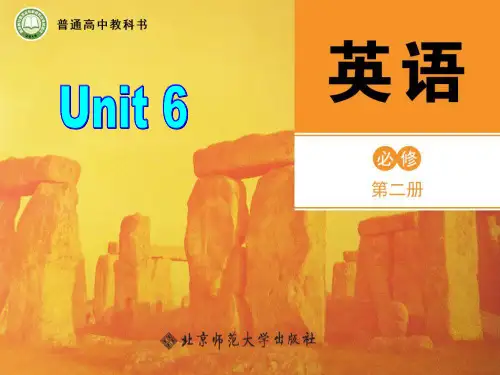
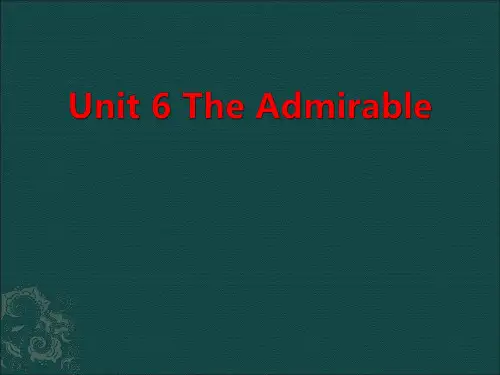
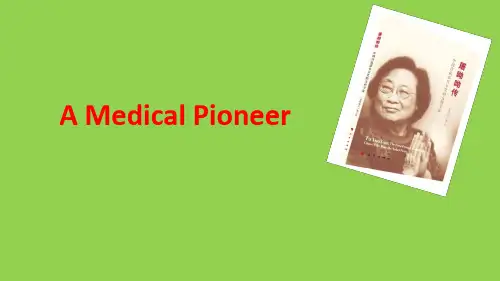
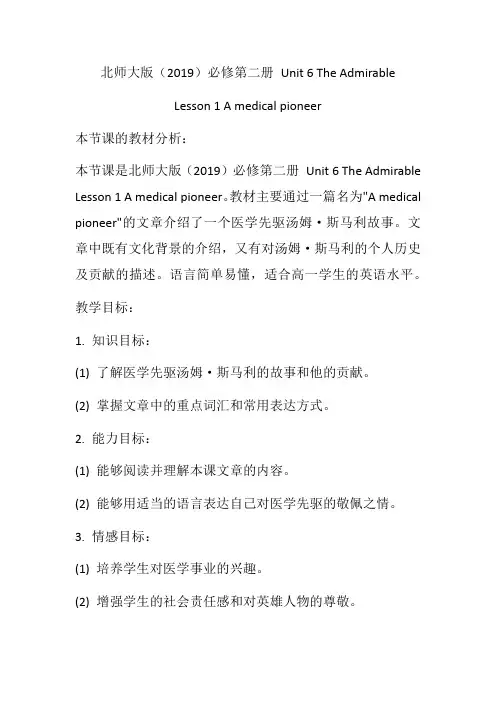
北师大版(2019)必修第二册Unit 6 The AdmirableLesson 1 A medical pioneer本节课的教材分析:本节课是北师大版(2019)必修第二册Unit 6 The Admirable Lesson 1 A medical pioneer。
教材主要通过一篇名为"A medical pioneer"的文章介绍了一个医学先驱汤姆·斯马利故事。
文章中既有文化背景的介绍,又有对汤姆·斯马利的个人历史及贡献的描述。
语言简单易懂,适合高一学生的英语水平。
教学目标:1. 知识目标:(1) 了解医学先驱汤姆·斯马利的故事和他的贡献。
(2) 掌握文章中的重点词汇和常用表达方式。
2. 能力目标:(1) 能够阅读并理解本课文章的内容。
(2) 能够用适当的语言表达自己对医学先驱的敬佩之情。
3. 情感目标:(1) 培养学生对医学事业的兴趣。
(2) 增强学生的社会责任感和对英雄人物的尊敬。
1. 阅读理解:通过阅读文章,理解医学先驱汤姆·斯马利的故事和他的贡献。
2. 词汇和表达:掌握文章中的重点词汇和常用表达方式。
教学难点:1. 阅读理解:理解医学先驱汤姆·斯马利的故事和他的贡献的细节。
2. 词汇和表达:运用所学的词汇和表达方式进行自由表达。
学情分析:学生是高一年级的学生,英语水平普遍较低,阅读理解和词汇掌握水平有待提高。
然而,他们对英雄人物和医学事业的兴趣可能较高,容易对医学先驱汤姆·斯马利的故事产生共鸣。
他们一般喜欢在课堂中进行小组合作讨论和角色扮演等活动。
教学策略:1. 情景教学策略:通过提供相关文化背景和真实案例,激发学生的学习兴趣和参与度。
2. 合作学习策略:采用小组合作讨论和角色扮演等活动,促进学生的互动和合作,加深对故事的理解。
1. 预习导入法:通过提问学生医学先驱的相关知识,激发学生的学习兴趣。
2. 细节理解法:采用师生共同阅读和讨论的方式,引导学生深入理解文章中的细节内容。
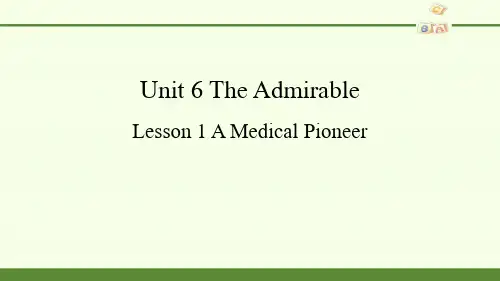
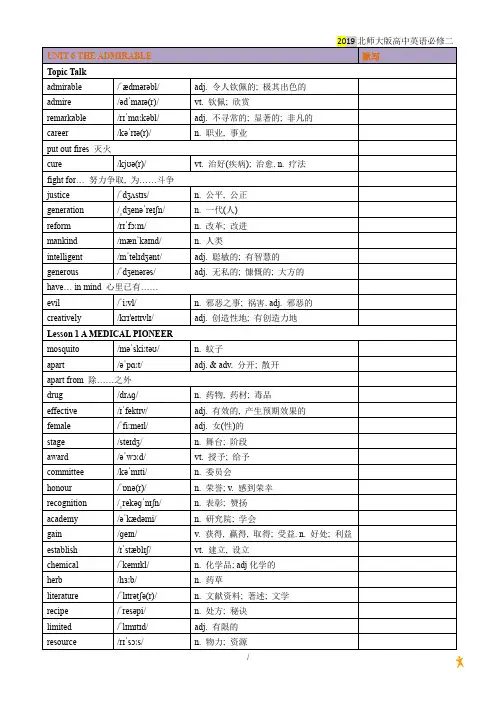
UNIT 6 THE ADMIRABLE默写Topic Talkadmirable /ˈædmərəbl/ adj. 令人钦佩的; 极其出色的admire /ədˈmaɪə(r)/ vt. 钦佩; 欣赏remarkable /rɪˈmɑːkəbl/ adj. 不寻常的; 显著的; 非凡的career /kəˈrɪə(r)/ n. 职业, 事业put out fires 灭火cure /kjʊə(r)/ vt. 治好(疾病); 治愈. n. 疗法fight for… 努力争取, 为……斗争justice /ˈdʒʌstɪs/ n. 公平, 公正generation /ˌdʒenəˈreɪʃn/ n. 一代(人)reform /rɪˈfɔːm/ n. 改革; 改进mankind /mænˈkaɪnd/ n. 人类intelligent /ɪnˈtelɪdʒənt/ adj. 聪敏的; 有智慧的generous /ˈdʒenərəs/ adj. 无私的; 慷慨的; 大方的have… in mind 心里已有……evil /ˈiːvl/ n. 邪恶之事; 祸害. adj. 邪恶的creatively /krɪ'eɪtɪvlɪ/ adj. 创造性地; 有创造力地Lesson 1 A MEDICAL PIONEERmosquito /məˈskiːtəʊ/ n. 蚊子apart /əˈpɑːt/ adj. & adv. 分开; 散开apart from 除……之外drug /drʌɡ/ n. 药物, 药材; 毒品effective /ɪˈfektɪv/ adj. 有效的, 产生预期效果的female /ˈfiːmeɪl/ adj. 女(性)的stage /steɪdʒ/ n. 舞台; 阶段award /əˈwɔːd/ vt. 授予; 给予committee /kəˈmɪti/ n. 委员会honour /ˈɒnə(r)/ n. 荣誉; v. 感到荣幸recognition /ˌrekəɡˈnɪʃn/ n. 表彰; 赞扬academy /əˈkædəmi/ n. 研究院; 学会gain /ɡeɪn/v. 获得, 贏得, 取得; 受益. n. 好处; 利益establish /ɪˈstæblɪʃ/ vt. 建立, 设立chemical /ˈkemɪkl/ n. 化学品; adj化学的herb /hɜːb/ n. 药草literature /ˈlɪtrətʃə(r)/ n. 文献资料; 著述; 文学recipe /ˈresəpi/ n. 处方; 秘诀limited /ˈlɪmɪtɪd/ adj. 有限的resource /rɪˈsɔːs/ n. 物力; 资源1staff /stɑːf/ n. 全体职员, 员工eventually /ɪˈventʃuəli/ adv. 最终; 终于come across 偶遇promising /ˈprɒmɪsɪŋ/ adj. 大有希望的fame /feɪm/ n. 名声, 名誉*renowned /rɪˈnaʊnd/ adj. 著名的, 有名望的*despite /dɪˈspaɪt/ prep. 尽管; 虽然wisdom /ˈwɪzdəm/ n. 知识, 学问; 智慧potential /pəˈtenʃl/ n. 潜力; 可能性advance /ədˈvɑːns/ n. 发展; 进步integrate /ˈɪntɪɡreɪt/ⅵ. & vt. (使)结合; (使)成为一体Lesson 2 HISTORY MAKERSMahatma /məˈhætmə/ n. 圣雄(印度对圣贤的称呼)* pick out 挑选peaceful /ˈpiːsfl/ adj. 和平的, 没有暴力的protest /ˈprəʊtest/ n. & vi. & vt. 抗议; 反对racial /ˈreɪʃl/ adj. 种族的; 人种的discrimination /dɪˌskrɪmɪˈneɪʃn/ n. 歧视inspiring /ɪnˈspaɪərɪŋ/ adj. 鼓舞人心的bar /bɑː(r)/ n. 铁栅; (门、窗等的)闩behind bars 在牢里skin /skɪn/ n. 皮肤What a shame! 真遗憾!further /ˈfɜːðə(r)/ adj. 更多的, 进一步march /mɑːtʃ/ n. 示威游行, 抗议游行self-evident /ˌself ˈevɪdənt/ adj. 不证自明的; 显而易见的judge /dʒʌdʒ/ vt. 评价; 判断impressive /ɪmˈpresɪv/ adj. 令人钦佩的, 给人印象深刻的respect /rɪˈspekt/ vt. & n. 尊敬; 敬佩independent /ˌɪndɪˈpendənt/ adj. 独立的, 自主的the other day 不久前某一天Lesson 3 THE SUPERHERO BEHIND SUPERMANhorror /ˈhɒrə(r)/ n. 令人惊恐的事*regard /rɪˈɡɑːd/vt. 认为, 看作be regarded as 被认为, 被看作novelist /ˈnɒvəlɪst/ n. 小说家journalist /ˈdʒɜːnəlɪst/ n. 新闻工作者passion /ˈpæʃn/ n. 强烈的爱好, 热爱; 激情opportunity /ˌɒpəˈtjuːnəti/ n. 机会; 时机2reputation /ˌrepjuˈteɪʃn/ n. 名誉; 名望awareness /əˈweənəs/ n. 认识; 意识organisation /ˌɔːɡənaɪˈzeɪʃn/ n. 组织; 团体; 机构strike /straɪk/ vi. & vt. 突然发生(某种不幸); 突然有坏的影响; 打, 击severe /sɪˈvɪə(r)/ adj. 很严重的movement /ˈmuːvmənt/ n. 运动, 动作, 活动nightmare /ˈnaɪtmeə(r)/ n. 噩梦, 梦魇*depression /dɪˈpreʃn/ n. 忧郁, 沮丧, 消沉; 抑郁症due to 由于, 因为ongoing /ˈɒnɡəʊɪŋ/ adj. 继续进行的, 不断发展的commitment /kəˈmɪtmənt/ n. 投入, 忠诚, 奉献; 承诺undertake /ˌʌndəˈteɪk/ vt. 着手做, 承担*intense /ɪnˈtens/ adj. 强烈的, 剧烈的engage /ɪnˈɡeɪdʒ/ ⅵ. 参加, 参与design /dɪˈzaɪn/ vt. 计划, 设计biography /baɪˈɒɡrəfi/ n. 传记*passionate /ˈpæʃənət/ adj. 具有强烈信念的; 热爱的, 酷爱的energetic /ˌenəˈdʒetɪk/ adj. 精力充沛的, 充满活力的advocate /ˈædvəkeɪt/ n. 提倡者, 拥护者, 鼓吹者disability /ˌdɪsəˈbɪləti/ n. 伤残, 残障, 障碍attitude /ˈætɪtjuːd/ n. 看法, 态度Writing Workshop A SUMMARY(1)summary /ˈsʌməri/ n. 概要; 摘要; 总结Reading Club 1daring /ˈdeərɪŋ/ adj. 勇敢的Reading Club 2originally /əˈrɪdʒənəli/ adv. 原先, 最初in spite of 尽管…… (仍……); 虽然; 不顾说明:带*号的词为《普通高中英语课程标准(2017年版)》必修和选择性必修以外词汇。
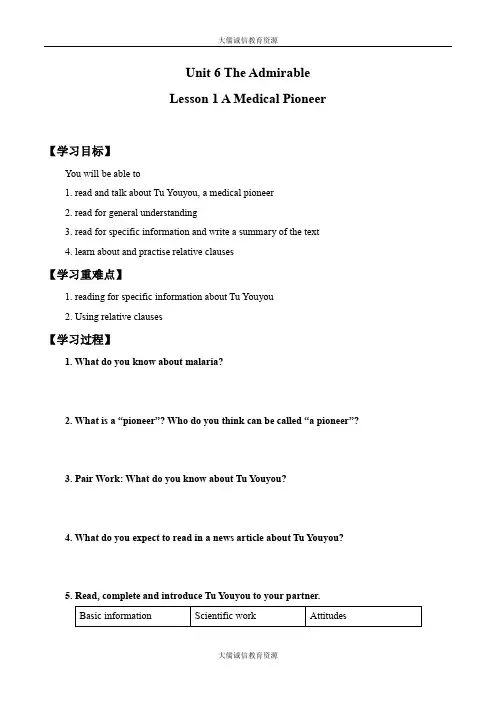
Unit 6 The AdmirableLesson 1 A Medical Pioneer【学习目标】You will be able to1. read and talk about Tu Youyou, a medical pioneer2. read for general understanding3. read for specific information and write a summary of the text4. learn about and practise relative clauses【学习重难点】1. reading for specific information about Tu Youyou2. Using relative clauses【学习过程】1. What do you know about malaria?2. What is a “pioneer”? Who do you think can be called “a pioneer”?3. Pair Work: What do you know about Tu Youyou?4. What do you expect to read in a news article about Tu Youyou?5. Read, complete and introduce Tu Youyou to your partner.6. Group Work: Summarise Tu Youyou’s personal quality.7. Group Work: Thank and share.(1) Why is Tu Youyou considered a medical pioneer?(2) What typical writing features can you identify in the news article about Tu Youyou?8. Underline relative clauses.1. A scientist who was on the Nobel Prize Committee called Hans Forssberg explained that …2. In 1969, Tu Youyou was chosen to establish a team whose goal was to find a cure for malaria …3. The reason why this was difficult was that the team had limited resources.9. Circle the words that are used to join the sentences together.1. Later, she studied Chinese medicine for two and a half years with experts in the field from whom she gained a deep knowledge about traditional practices.2. They did not have enough staff, and the laboratory in which they worked had poor air quality.10. Join the pairs of sentences using relative pronouns.1. We climbed to the top of the mountain. We had a beautiful view from there.2. David is my friend. I often play tennis with him.3. He has 20 books. Only two of them are interesting.4. This is quite an interesting job. I really want to apply for it.11. Express Yourself.Suppose your school wants to choose three most admirable people as role models. You have one minute to persuade the committee to include Tu Youyou. Use at least three relative clauses to present your recommendation.________________________________________________________________________________________________________________________________________________________________________________________________________________________________________________________________________________________________________________________________________________________________________________________________________________________________________________________________________【精炼反馈】I. 请从方框中选择恰当的单词或短语,并用其适当形式填空。
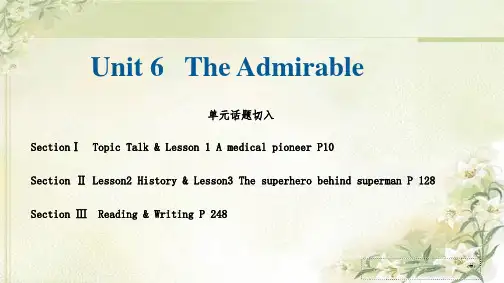
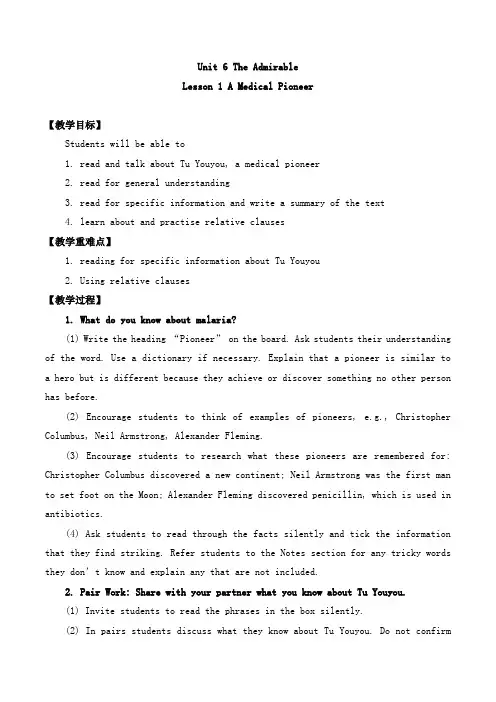
Unit 6 The AdmirableLesson 1 A Medical Pioneer【教学目标】Students will be able to1. read and talk about Tu Youyou, a medical pioneer2. read for general understanding3. read for specific information and write a summary of the text4. learn about and practise relative clauses【教学重难点】1. reading for specific information about Tu Youyou2. Using relative clauses【教学过程】1. What do you know about malaria?(1) Write the heading “Pioneer” on the board. Ask students their understanding of the word. Use a dictionary if necessary. Explain that a pioneer is similar to a hero but is different because they achieve or discover something no other person has before.(2) Encourage students to think of examples of pioneers, e.g., Christopher Columbus, Neil Armstrong, Alexander Fleming.(3) Encourage students to research what these pioneers are remembered for: Christopher Columbus discovered a new continent; Neil Armstrong was the first man to set foot on the Moon; Alexander Fleming discovered penicillin, which is used in antibiotics.(4) Ask students to read through the facts silently and tick the information that they find striking. Refer students to the Notes section for any tricky words they don’t know and explain any that are not included.2. Pair Work: Share with your partner what you know about Tu Youyou.(1) Invite students to read the phrases in the box silently.(2) In pairs students discuss what they know about Tu Youyou. Do not confirmideas at this point.(3) Invite pairs to come to the front of the class and share what information they know about Tu Youyou. Gather any interesting details and write them on the board.3. What do you expect to read in a news article about Tu Youyou?(1) Tell students that they will be reading a news article about Tu Youyou. Draw students’ attention to the photo on page 52 and ask them what they think is happening in the picture, i.e., Tu Youyou is at the Nobel Prize Lecture receiving the prize.(2) Students write at least three questions they would like to ask about Tu Youyou.4. Read and find out.(1) Tell students that they will be reading a news article on a pioneer.(2) Allow students time to read the full article or call on volunteers to read the passage aloud.(3) Encourage students to try to use context to understand unknown terms.(4) If needed, instruct students to draw a ruler line under each paragraph. Then provide a general sentence for each paragraph that acts as a summary. This will help the students to sort out the new information.(5) Ask students if their questions were answered in the news article.(6) If there is time, make a list of any unanswered questions and search for answers on the Internet or assign students to find the answers at home.5. Read, complete and introduce.(1) Tell students to read the news article in more detail, they should take their time to go through the text carefully.(2) Draw students’ attention to the mind map on page 54 and have students read the topics they need to find details about in the news article. Clarify any unknown words before students start reading.(3) Encourage students to underline the parts of the text that contain the information.(4) Help any struggling students by giving them the paragraph number where each piece of information is located.(5) Once students have completed their notes, have them share their answers with a partner or with the class.6. Match and talk about Tu Youyou’s work and achievement.(1) Divide students into groups based on their understanding level. Allow high level students to complete the exercise independently. Encourage middle level students to work together to read the rubric and words in the columns. Then complete the activity. Support low level students by listening as they read the words in the columns aloud and explain unknown terms. Then help low level students to match the columns.(2) Encourage students to use their dictionaries for understanding.7. Group Work: Summarise Tu Youyou’s personal quality.(1) Remind students about qualities of admirable people.(2) In small groups students discuss Tu Youyou’s personal qualities. Encourage students to provide reasons for their answers.(3) Assign one representative to share their group’s answers with the class.8. Group Work: Think and share.(1) In small groups students discuss the questions. Encourage students to provide reasons for their answers.a. Why is Tu Youyou considered a medical pioneer?b. What typical writing features can you identify in the news article about Tu Youyou?(2) Assign one representative to share the group’s answers with the class.9. Identify relative clauses.(1) Explain to students that a relative clause is a part of a sentence that has a verb in it and is joined to the rest of the sentence by words such as “who”, “which”, “where”, “when”.(2) Instruct students to work in pairs to read aloud the sentences and to point out the verbs which indicate the relative clauses.(3) If needed, have students look at the Grammar Summary, Unit 6, Relative Clauses on page 92. Read through the rules and examples with the class and ensure that students understand relative clauses in the examples.(4) Students can independently tick the sentences that include a relative clause.10. Which words are used to join the sentences together?In pairs students read the sentences and circle words that link sentences or clauses together. Ask students if they notice common words and summarise how they are used.11. Join the pairs of sentences using relative pronouns.(1) Explain to students that a relative pronoun is used to connect a clause or phrase to a noun or pronoun. The clause modifies or describes the noun. The most common relative pronouns are who, whom, whose, which, and that.(2) Instruct students to work in pairs to read aloud the sentences and to join the two sentences with relative pronouns.(3) If needed, have students look at the Grammar Summary, Unit 6, Relative Clauses on page 92. Read through the rules and examples with the class and ensure that students understand relative pronouns in the examples.(4) Students can independently write and join the sentences using relative pronouns.12. Express yourself.(1) Instruct students to write three sentences on the admirable qualities of Tu Youyou using relative clauses. Their sentences need to be persuasive for a committee to include Tu Youyou as a role model.(2) Students read their sentences to the class.(3) Put two groups of students together and have one of them be the committee. The other group should present their arguments in order to persuade the committee. Find out whether this is the case or not. Then have groups change roles.。
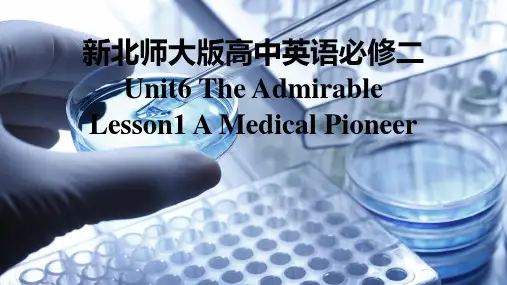
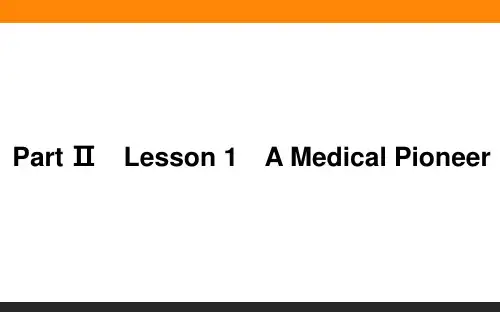
北师大版必修第二册UNIT 6 课文阅读理解lesson1Step 1Fast-readingⅠ.Read the passage quickly and fill in the following blanks with suitable words.1.Zhejiang Province 2 medicine3 cure 4 artemisinin 5 fameⅡ.What’s the main idea of the text?The main idea of the passage is that Tu Youyou was _______ a Nobel Prize for her ________of artemisinin.答案awarded;discoveryStep 2Careful-readingChoose the best answer.1.How old was Tu Youyou when she got the Nobel Prize?A.82. B.83. C.84. D.85.2.Who helped Tu Youyou discover the life-saving drug?A.Her friends. B.Her family.C.No one. D.Her team.3.How long did Tu Youyou study Chinese medicine with experts in the field?A.Two and a half years. B.One and a half years.C.A half year. D.Three and a half years.4.Why was it difficult for them to discover artemisinin?A.Because the team didn’t have enough money.B.Because the team didn’t have enough resources.C.Because the team didn’t have enough books.D.Because the team wasn’t good at doing experiments.5.What can we learn from the passage?A.Tu Youyou is not interested in fame.B.Tu Youyou doesn’t continue to conduct research today because of her age.C.Tu Youyou was forced to be the first human subject.D.Tu Youyou used traditional research methods to study the Chinese herbs.答案CDABAStep 3Post-readingⅠ.After reading the passage,please fill in the following blanks.Tu Youyou is famous around the world.She is the first female Chinese scientist 1._________(win) the Nobel Prize.She was born in Zhejiang Province,China,2.______ 30 December,1930.She studied medicine at Peking University Health Science Center.After3._________(graduate),she became a member of China Academy of Chinese Medical Sciences.In 1969,she4.________(choose) to establish a team to find a cure5.______ malaria—a disease that killed millions of people every year.It was not an easy task.They had6.________(limit) resources and they did not have enough staff.They tested more than 240,000 chemicals with no success.Tu Youyou studied ancient Chinese medical literature and visited experts in7.________(tradition) Chinese medicine.Then Tu Youyou and her team used modern research methods to study the Chinese herbs one by one.After hundreds of8.______(fail) experiments,they eventually came across a promising chemical.The medicine they discovered was artemisinin,9.______ has now become the world’s 10._________(effective) drug for fighting malaria.1.to win 2 on 3 graduation 4 was chosen 5 for6 limited 7 traditional 8 failed9 which 10 most effectiveⅡ.Discuss with your partner and then answer the following questions.1.Why is Tu Youyou considered a medical pioneer?2.Do you want to become an admirable person? Why and how?Step 4Sentence-learning1.A scientist who was on the Nobel Prize Committee called Hans Forssberg explained that “the discovery of artemisinin has led to the development of new drugs which have saved the lives of millions”.___________________________________________________________2.Later,she studied Chinese medicine for two and a half years with experts in the field from whom she gained a deep knowledge about traditional practices.___________________________________________________________3.Tu Youyou bravely volunteered to be the first human subject when they were ready to start testing and the rest of her team followed her.___________________________________________________________1[句式分析]本句是复合句。
人与自我——优秀品行
本节课是高中英语第二册Unit 6 Admirable的第一课A Medical Pioneer,
Strengths:1.经过高中整个阶
段的学习之后,学生基本熟悉
高中英语单元整体结构;
2.具备相对丰富的语言基础
和一定综合运用语言的能力。
Weaknesses:学生对词汇句法
的学习熟悉,但是缺乏兴趣,
以及对部分知识点的把握有
待提高。
Opportunities: 本篇阅读文
本从对于屠呦呦导入报道引
入,是学生普遍较感兴趣的内
容。
词汇学习相对比较
枯燥,很多词汇句子学生输出
较困难。
引导学生通过自主阅读和小组合作完成对医学先驱屠呦呦个人经历和。
Unit 6 AdmirableLesson 1 A Medical Pioneer教学设计本节课是高中英语第二册Unit 6 Admirable的第一课A Medical Pioneer,课型是阅读课。
本节课主要内容是介绍了中国获得诺贝尔医学奖的科学家屠呦呦的故事,并介绍了她和她的团队是如何利用中药发现了治疗疟疾的故事。
通过学习本课,使学生们了解中国获得诺贝尔奖的历史性时刻,还让学生懂得任何成功的背后都离不开不懈的努力和奋斗。
此外,学生还将学到介词加关系代词的定语从句。
1.语言技能目标(1)学生能够借助关键词,在理解文章大意的基础上,找出段落主题句,完成读前问题;(2)用所学的词汇和语言的对课文进行复述;(3)能够读懂细节信息并能理解阅读中生词含义。
2.语言知识目标(1)能够正确运用一下单词和短语: admirable, infectious, vomit, vaccine, award, recognition, academy(academic), herb, recipe, limit(limited), staff, fame, influential, conduct, potential, integrate等。
(2)能掌握定语从句(Relative Clause)的使用情况;(3)能够区别和理解定语从句中关系代词、关系副词以及介词加关系代词的情况。
3.文化意识目标(1)了解伟大人物及其事迹相关话题;(2)了解人们对伟人及其事迹的看法。
4.情感态度目标正确认识、对待伟人及其事迹,并能够在生活和学习中充分利用伟人的拼搏精神。
1.重点(1)如何理解本课中出现的相关术语表达;(2)正确理解并运用定语从句;(3)能够运用所学对伟人及其事迹进行介绍。
2. 难点(1)能用得体的用英语解释本课中出现的相关名词并阐述自己的看法;(2)能正确掌握和使用定语从句;(3)能够区别定语从句中关系代词、关系副词和介词加关系代词的使用情况。